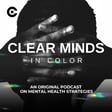
The Diddy Case Blind Spot (Part 3)
In this final installment of The Diddy Case series, we explores how the same patterns of power, silence, and complicity that shape public scandals also show up in our homes, workplaces, and communities.
Drawing from trauma-informed care and public-health psychology, this episode reveals how control and coercion often hide behind care, charisma, and loyalty—and how recognizing those behaviors is the first step toward healing.
Through reflection and real-world strategies, Robert offers tools for accountability rooted in empathy and integrity, helping listeners build safety and emotional resilience in their everyday lives.
Episode highlights:
How subtle power dynamics impact mental health and relationships.
Why culture struggles to separate art from accountability.
Trauma-informed strategies for empathy, communication, and repair.
Reflection prompts to help you practice everyday courage.
Hosted by: Robert Saint Michael, NLP | Mental Health Coach
Presented by: Clear Minds In Color — evidence-based mental-health strategies and public-health interventions that promote healthy mental hygiene and resilient communities.
Learn more: clearmindsincolor.com
Referenced in this Episode
Latané, B. & Darley, J. – The Bystander Effect: Diffusion of Responsibility and Social Influence, Journal of Personality and Social Psychology (1968).
Harvard Business Review – The Hidden Forms of Workplace Power — research on subtle coercion and emotional leverage in organizational structures.
United Nations Human Rights Council – Conflict-Related Sexual Violence Annual Report — documentation of power, control, and silence in global systems of harm.
McCutcheon, L. E. et al. (2002) – A Cognitive Profile of Individuals Who Tend to Worship Celebrities, Psychological Reports.
APA Division 56 (Trauma Psychology) – Trauma-Informed Approaches to Healing and Accountability — best practices for trauma recovery and cultural prevention.
Clear Minds In Color – clearmindsincolor.com — evidence-based resources for mental wellness and community health.






